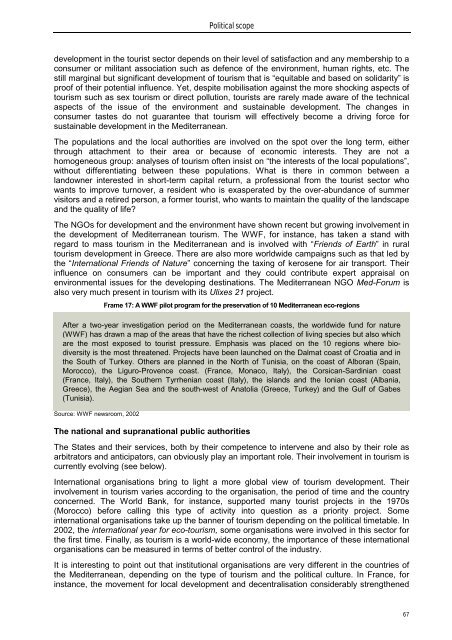dossier sur le tourisme et le développement durable
dossier sur le tourisme et le développement durable
dossier sur le tourisme et le développement durable
You also want an ePaper? Increase the reach of your titles
YUMPU automatically turns print PDFs into web optimized ePapers that Google loves.
Political scope<br />
development in the tourist sector depends on their <strong>le</strong>vel of satisfaction and any membership to a<br />
consumer or militant association such as defence of the environment, human rights, <strong>et</strong>c. The<br />
still marginal but significant development of tourism that is “equitab<strong>le</strong> and based on solidarity” is<br />
proof of their potential influence. Y<strong>et</strong>, despite mobilisation against the more shocking aspects of<br />
tourism such as sex tourism or direct pollution, tourists are rarely made aware of the technical<br />
aspects of the issue of the environment and sustainab<strong>le</strong> development. The changes in<br />
consumer tastes do not guarantee that tourism will effectively become a driving force for<br />
sustainab<strong>le</strong> development in the Mediterranean.<br />
The populations and the local authorities are involved on the spot over the long term, either<br />
through attachment to their area or because of economic interests. They are not a<br />
homogeneous group: analyses of tourism often insist on “the interests of the local populations”,<br />
without differentiating b<strong>et</strong>ween these populations. What is there in common b<strong>et</strong>ween a<br />
landowner interested in short-term capital r<strong>et</strong>urn, a professional from the tourist sector who<br />
wants to improve turnover, a resident who is exasperated by the over-abundance of summer<br />
visitors and a r<strong>et</strong>ired person, a former tourist, who wants to maintain the quality of the landscape<br />
and the quality of life?<br />
The NGOs for development and the environment have shown recent but growing involvement in<br />
the development of Mediterranean tourism. The WWF, for instance, has taken a stand with<br />
regard to mass tourism in the Mediterranean and is involved with “Friends of Earth” in rural<br />
tourism development in Greece. There are also more worldwide campaigns such as that <strong>le</strong>d by<br />
the “International Friends of Nature” concerning the taxing of kerosene for air transport. Their<br />
influence on consumers can be important and they could contribute expert appraisal on<br />
environmental issues for the developing destinations. The Mediterranean NGO Med-Forum is<br />
also very much present in tourism with its Ulixes 21 project.<br />
Frame 17: A WWF pilot program for the preservation of 10 Mediterranean eco-regions<br />
After a two-year investigation period on the Mediterranean coasts, the worldwide fund for nature<br />
(WWF) has drawn a map of the areas that have the richest col<strong>le</strong>ction of living species but also which<br />
are the most exposed to tourist pres<strong>sur</strong>e. Emphasis was placed on the 10 regions where biodiversity<br />
is the most threatened. Projects have been launched on the Dalmat coast of Croatia and in<br />
the South of Turkey. Others are planned in the North of Tunisia, on the coast of Alboran (Spain,<br />
Morocco), the Liguro-Provence coast. (France, Monaco, Italy), the Corsican-Sardinian coast<br />
(France, Italy), the Southern Tyrrhenian coast (Italy), the islands and the Ionian coast (Albania,<br />
Greece), the Aegian Sea and the south-west of Anatolia (Greece, Turkey) and the Gulf of Gabes<br />
(Tunisia).<br />
Source: WWF newsroom, 2002<br />
The national and supranational public authorities<br />
The States and their services, both by their comp<strong>et</strong>ence to intervene and also by their ro<strong>le</strong> as<br />
arbitrators and anticipators, can obviously play an important ro<strong>le</strong>. Their involvement in tourism is<br />
currently evolving (see below).<br />
International organisations bring to light a more global view of tourism development. Their<br />
involvement in tourism varies according to the organisation, the period of time and the country<br />
concerned. The World Bank, for instance, supported many tourist projects in the 1970s<br />
(Morocco) before calling this type of activity into question as a priority project. Some<br />
international organisations take up the banner of tourism depending on the political tim<strong>et</strong>ab<strong>le</strong>. In<br />
2002, the international year for eco-tourism, some organisations were involved in this sector for<br />
the first time. Finally, as tourism is a world-wide economy, the importance of these international<br />
organisations can be mea<strong>sur</strong>ed in terms of b<strong>et</strong>ter control of the industry.<br />
It is interesting to point out that institutional organisations are very different in the countries of<br />
the Mediterranean, depending on the type of tourism and the political culture. In France, for<br />
instance, the movement for local development and decentralisation considerably strengthened<br />
67
















